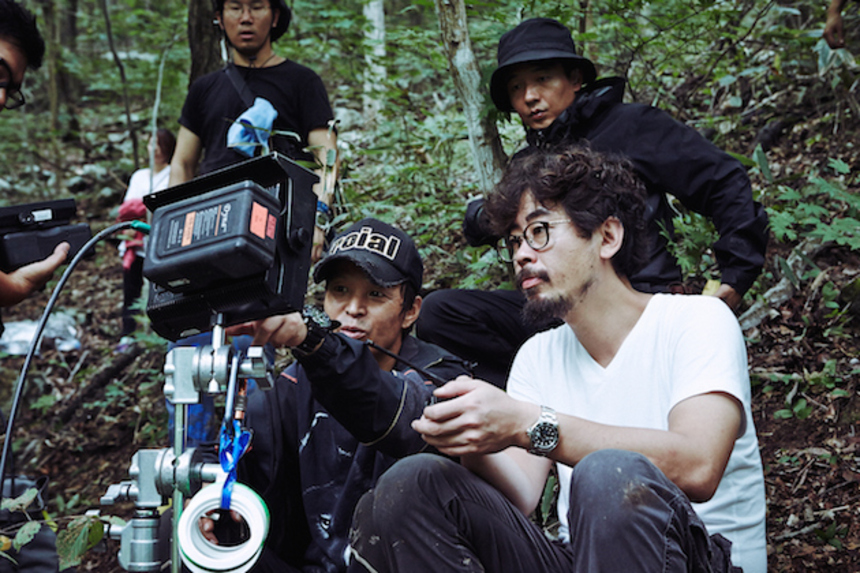Interview: THE WAILING's Na Hong-jin, Questions For A Mastermind Of Evil

Out now in North America, Na Hong-jin's blistering new thriller The Wailing is making waves like few other Korean films have in the past decade. The film debuted at the Cannes Film Festival last month, where we were able to sit down with director Na and ask him how he came about creating such a unique and terrifying work.
ScreenAnarchy: THE WAILING evokes a very potent sense of evil, but particularly fear, especially of the unknown. Was this the reason you cast Kunimura Jun, a Japanese actor, in the role?
Na Hong-jin: Actually, xenophobia has nothing to do with it. Here, the figure of the father wants to defend and protect his family from a great threat. But what is this kind of threat? The father isn't someone who is defending himself with a shield from something like knives coming before him. He's more like someone who is hiding in a castle and must defend his castle. Strangers invade yet he doesn't know if they are allies or enemies. This was the kind of threat that I wanted to express. It's like a hidden threat deep inside. I felt that this would be more terrifying than a dynamic threat - something dwelling inside and not visible. I wanted to show this threat through someone with similar physical characteristics to Koreans. This is why I cast a Japanese actor. As time went by he would reveal his true nature and we would realise that he is different and that even communication is impossible. I wanted to express the fear coming from this impossibility of communication.
You incorporate both Western and Eastern religious elements, but the most impressive of these are the terrifying ritual scenes. Shamanism is a very mysterious religion that, as I understand, many Koreans have a tough time understanding as well. Is this part of why you focused on it so much?
There were some occult elements in the film and of course when I watched some similar occult movies I realized that at one point in time there is a general trend where all those movies were no longer as perfect or as high quality as they used to be. I didn't want to deal with this specific occult genre because I felt it couldn't really appeal to Korean audiences as none of those films have had any history of success in Korea. I was a little worried but thought that if I could add some Asian or Korean elements to the film, the story would completely change and there could be a twist. I added shamanism simply because I am a Korean and this is a Korean film.
All your films feature key scenes that take place on roads, which generally involve people chasing each other. Is there a reason they're so important for you?
I think it has nothing to do with the style, it's just a part of the narrative and the characters. It seems so normal for me to have them in those situations. Visually I wouldn't consider it a style, it's just a natural thing to have them on the road in those chasing scenes.
You've developed quite a reputation for taking genre elements and subverting them. Is there a special process for you to do this?
I write scenarios and just try to find the harmony or unity in the overall scenario, but I wouldn't say I have any special process for that.
On the surface Korean cinema is very healthy but there are some who worry that directors and producers don't have the same influence that they did in the past. I've heard that despite some communication issues, you had a lot of creative freedom working with 20th Century Fox. Do you think these major companies coming into Korea, such as Warner Bros. and Netflix, could provide a new creative boost to the industry?
I think that if they bring some diversity to the cinema industry it can only be good and it will change things. But in a specific way I cannot say anything as I haven't worked with those other companies but I think that the conditions of production will change. I hope that they will change because for the moment they are quite homogeneous. I don't know if they will bring something good or bad, it's too early to say. I say that I don't know as throughout my career no one has ever interfered with my work.
As you know, making a movie is a collective work so I think that one of the duties of the director is to listen to the opinions that his own crew and cast have and to control and to harmonize all those opinions in order to get the best results from them. Regarding this change I can't be sure of the outcome but I think it will be heavily tied to the ability of persuasion.
The most important thing is that so far I'm in quite a different position as all my movies never leaned too much on either the artistic or the commercial side. I've always tried to create good balance between both and the people that work with me know that.
I hope we won't have to wait another six years for a new film from you!
As I've mentioned, this movie was a very difficult one for me as I had no knowledge of the subject beforehand. However, I think I've learned a lot through it and I really want to be faster next time.







